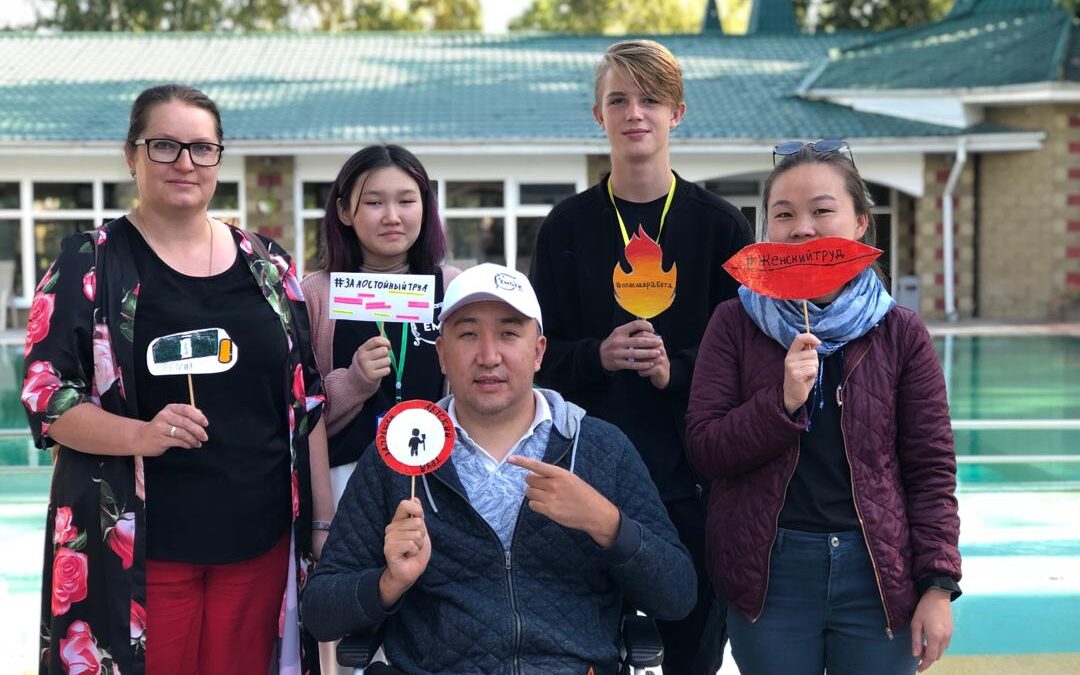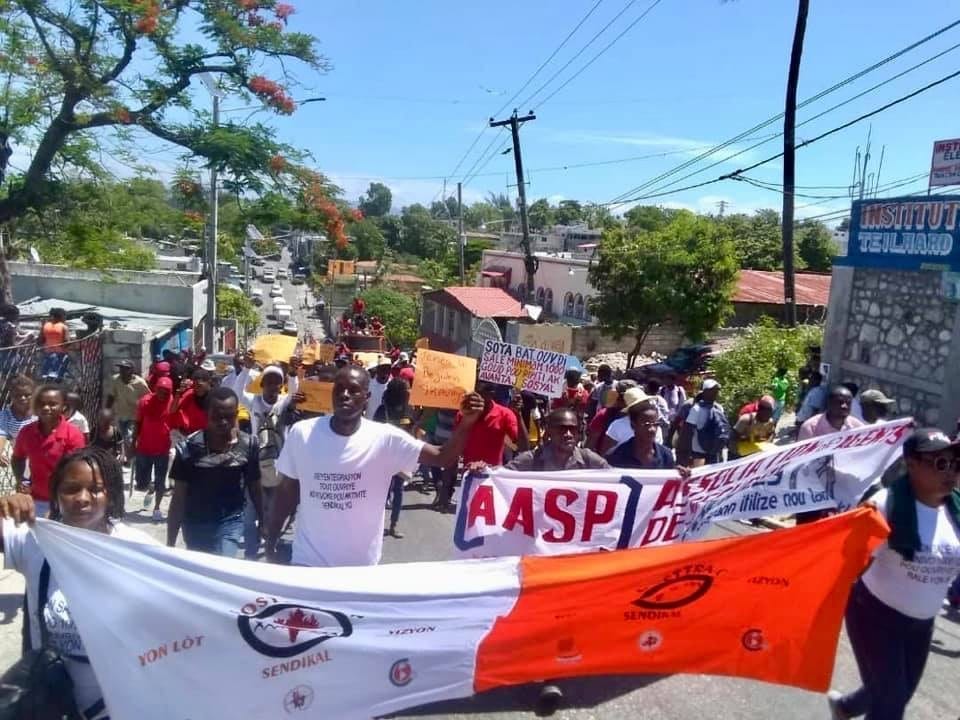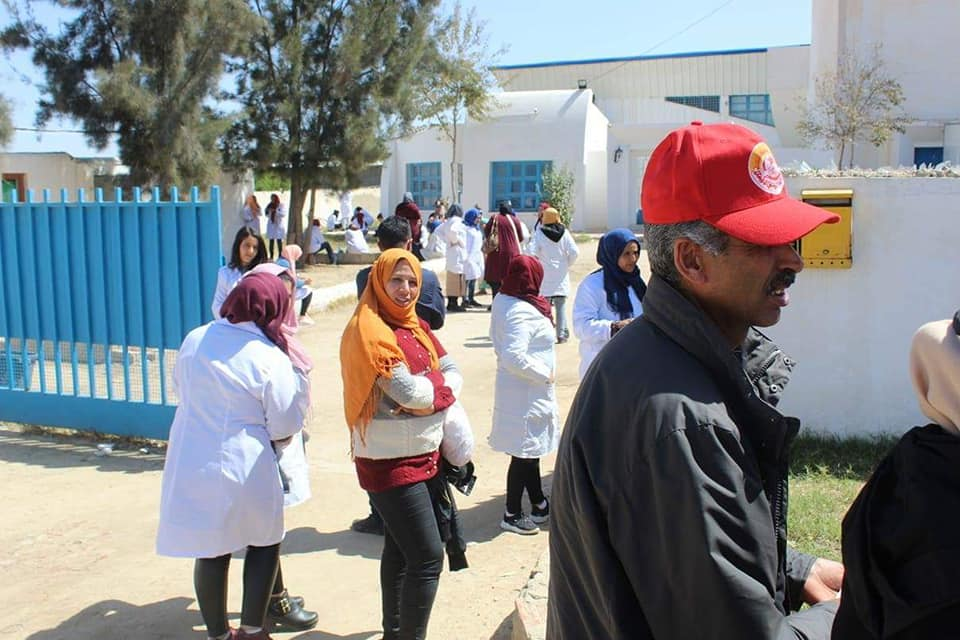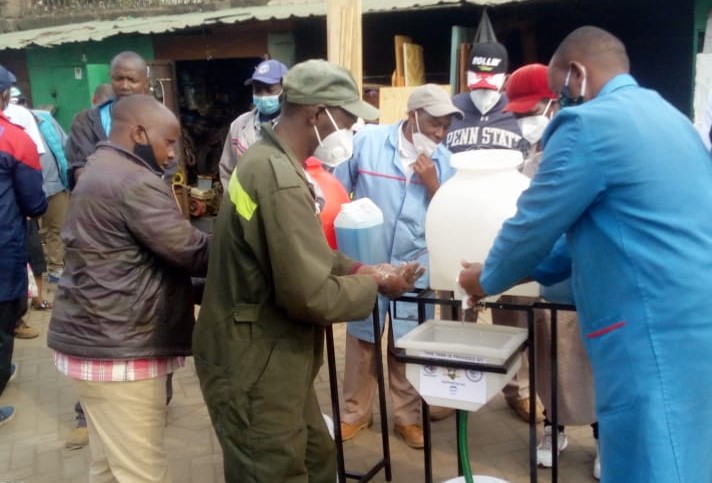
Sep 21, 2020
To promote youth civic engagement and the fair employment of women, workers with disabilities and those migrating outside the country to earn a living, the Solidarity Center’s second annual School of Young Leaders in Bishkek educated dozens of young people in mid-September about their protections under the country’s labor code, with a special focus on disability rights. Event attendees—selected from around the country based on a writing competition—included youth and mentors with disabilities.
“This is my first experience in the framework of an inclusive society—where no one divides into some groups, everyone supports each other, accepts each other equally and shares their experiences,” said Sezim Tolomusheva, organizing and socioeconomic protection lead specialist for the Union of Textile Workers of Kyrgyzstan.
During a session covering how to engage traditional and social media, local disability-rights activist and blogger Askar Turdugulov encouraged attendees to pursue their goals despite limitations, such as the spinal injury that impaired his ability to walk from age 18.
“This [event] is a bright example in the promotion of the principle of ‘equal opportunities for all’ that gives equal labor rights for all people, regardless of their origin, gender or health status,” said Turdugulov.
Participating NGOs, trade unions and government agencies also provided young attendees—many of whom work directly to aid migrant workers and some of whom may one day migrate for work—with information about common challenges for migrant workers, the protective role of the Kyrgyz Migrant Workers’ Trade Union, the importance of pre-departure trainings and information about labor laws in destination countries. Other highlights included discussion on the rights of women at work under national legislation and the International Labor Organization’s 2019 Convention: Eliminating Violence and Harassment in the World of Work (C190). NGOs contributing expertise to the event included the “Equal Opportunities” Social Center and the Public Association of Girls with Disabilities, Nazik-Kyz.
Youth un- and under-employment in Kyrgyzstan stands at 55 percent. Most young people feel forced to migrate in search of work, primarily to Russia and Kazakhstan, although also further to South Korea, Turkey or other countries. Kyrgyz migrant workers provide more than one-third of the Central Asian country’s GDP in money they send home. When workers migrate from Kyrgyzstan, they often face discrimination, exploitation and unsafe working conditions. Many are at risk of being trafficked and subjected to forced labor.
Kyrgyzstan ratified the UN Convention on the Rights of Persons with Disabilities (CRPD) on February 7, 2019. The primary work needed for CRPD implementation will be expanding access for people with disabilities to education, justice and employment opportunities, physical therapy and rehabilitation services, medical and social assistance, and ensuring their free movement through promotion of universal design.
Sep 14, 2020
“We see desperate workers willing to accept very low wages in extremely dangerous conditions, with no serious health and safety protections, let alone social distancing measures or personal protective equipment,” said Jon Hartough, Solidarity Center Bangladesh program director. When Bangladesh reopened hundreds of garment factories in April, thousands of desperate workers flocked back to overcrowded industrial areas, including the capital of Dhaka, which currently has the bulk of the country’s reported coronavirus infections.

Sep 14, 2020
As the U.S. Congress considers renewal of the Caribbean Basin Trade Partnership Act (CBPTA) for Haiti, labor rights provisions must be enforced for trade benefits to reach 57,000 Haiti garment workers, says Solidarity Center Americas Regional Program Director Lauren Stewart.
Testifying before the House Ways and Means Committee Thursday, Stewart says labor violations persist at garment factories because authorities do not impose or collect fines for infractions and the government has not effectively enforced the law—as also noted in a 2019 U.S. State Department human rights report. Noncompliance with internationally recognized worker rights is among criteria for CBTPA eligibility for beneficiary countries. (Read Stewart’s written testimony here.)
Further, trade preference programs with Haiti, such as the CBTPA, which allows duty-free access for Caribbean countries to the U.S. markets, have not specified labor rights enforcement “in a way that there is actual teeth,” Stewart said.
Solidarity Center union partners in Haiti say trade agreements should specify the amount of time a factory can be in noncompliance before losing its trade preference eligibility, and should be required to demonstrate progress in remedying violations before being readmitted, she says. Further, unions say there should be a limited number of times a noncompliant factory can be admitted to trade preference programs.
Haiti Garment Workers Struggle to Form Unions

Trade preference agreements for Haiti’s garment industry must include enforcement for decent working conditions and freedom to form unions—Lauren Stewart
With labor abuses unaddressed, garment workers endure poor working conditions and low wages: A 2019 Solidarity Center living expense survey estimated the minimum wage for garment workers in Port-au-Prince at least three times less than basic cost of living.
But because the country has a history of repressing worker efforts to form unions to improve working conditions, many workers fear exercising their right to freedom of association.
“Trade preference programs that enforce workers’ right to organize and bargain is critical to improve working conditions in Haiti,” Stewart told committee members.
There is only one authentic collective bargaining agreement in the garment sector—which means “the great majority of workers are unable to negotiate higher wages and lack a voice in shaping the terms of their labor,” Stewart said.
Although the CBTPA and other trade preference programs in the Caribbean Basin Initiative have stimulated Haiti’s garment industry, Stewart says the economic gains of garment industry have not translated into decent wages and working conditions.
Enforcing worker rights provisions in the CBTPA is “critical to guaranteeing internationally recognized worker rights and fostering the rule of law, both of which are necessary to promote stability and economic development in Haiti,” Stewart said.
The CBPTA expires September 30 and Congress is considering its renewal to 2030.
Witnesses also included Republic of Haiti Ambassador Hervé H. Denis, Georges Sassine, Association des Industries d’Haïti board member, Beth Baltzan, principal at American Phoenix Trade Advisory Services and Jerry Cook, Hanesbrands vice president for government and trade relations.

Sep 9, 2020
The Tunisian General Labor Union (UGTT) is calling on employers and the government to join with it in addressing the severe challenges textile workers are facing during the COVID-19 crisis and negotiate an action plan to guide the struggling garment sector.
Some 160,000 workers, the vast majority of whom are women younger than age 35, work in Tunisia’s textile industry, which accounts for 34 percent of the country’s manufacturing sector. Following the country’s coronavirus lockdown, workers lost jobs and pay, in part because the industry experienced a 45.2 percent decline in textile exports in March from the previous year, according to the National Institute of Statistics in Tunisia. Many corporate brands also canceled “mid-season” orders.
But crucially, employers also took advantage of the COVID-19 crisis to cease or suspended paying workers’ social security benefits or family allowances, such as food tickets, under the pretext of force majeure, union leaders say. Employers coerced workers, especially new employees, into signing fixed-term contracts and giving up their status as permanent workers. Workers also say some employers blocked their efforts to form unions to gain fundamental rights on the job, closed union offices—prohibiting workers from meeting in the office even outside working hours—and removed posters and other legally placed union material from worksites.

Habib Al-Hazami. Credit: General Federation of Textile Leather and Footwear
“All trade union activists and the General Federation affirm that the garment and textile sector in Tunisia has been marginalized and is facing a crisis,” says Habib Al-Hazami, general secretary of the General Federation of Textile, Leather, and Footwear.
In April, the Tunisian General Labor Union (UGTT) and the Tunisian Federation for Industry and Trade entered into a landmark agreement on workers’ wages, including textile workers’ wages. The government agreed to contribute $73 per worker, with the remaining salary paid by employer. Employers also agreed to register unregistered workers with the National Social Security Fund within a month after the agreement to ensure they are eligible for social benefits.
Although the lockdown ended June 27 and many factories resumed nearly full production, union leaders say worker rights’ violations persist, with factories not following government regulations to slow the spread of the novel coronavirus.
In calling for discussions with employers and the government, UGTT is seeking to:
- Strengthen job security for garment and textile workers by reducing short-term contracts and increasing formal employment.
- Examine how best to restructure the sector with a focus on ethical market competition so workers do not bear the brunt of corporate brands’ rush for products at the lowest cost.
- Take urgent steps to end gender-based violence and harassment at work and ensure decent working conditions.
- Increase workplace inspections to monitor potential safety and health violations.
- Create space for workers to form and join unions so they have a voice on the job.

Aug 27, 2020
In a joint effort to protect market vendors and workers and reduce community spread of COVID-19, Kenya’s labor federation, Central Organization of Trade Unions (COTU-K), last week provided three of its affiliates with infection control supplies for distribution through the informal worker organizations that they represent. Under the August 13 “COTU CARES” campaign, six organizations that represent almost 6,000 informal workers are distributing to their Nairobi-based members, with Solidarity Center support, 4,000 KN95 face masks, 2,000 pairs of disposable surgical hand gloves, 100 pairs of industrial hand gloves, 140 gallons of liquid handwashing soap, 100 soap containers, 46 gallons of hand sanitizer, 36 handwashing stands and nine thermal body temperature scanners.
“Many people think that trade unions only represent formal workers, but now you know that informal workers are equally important and that’s why we are here,” said Rose Omamo, general secretary of the Amalgamated Union of Kenya Metal Workers (AUKMW), which helps represent automobile mechanics.
Recipients of the distribution include informal worker organizations Grogon-Ngara Food Vendors Association, metal worker associations Ambira Jua Kali and Migingo Mechanics Self Help Group, Muthurwa Cleaners Association, Muthurwa Food Court Vendors Association and street vendor association Nairobi Informal Sector Confederation (NISCOF). COTU-K affiliate participants include AUKMW, the Kenya Long Distance Truck Drivers Union (KLDTDU), the Kenya Union of Commercial, Food and Allied Workers (KUCFAW) and the Kenya Union of Domestic, Hotels, Educational Institutions, Hospitals and Allied Workers (KUDHEIHA).
Given the prominence of market shopping in Kenyan citizen’s daily lives—96 percent of the country’s retail is informal—together with relatively high infection rates of market vendors, infection control at markets is essential for containment of the pandemic. Scientists surveying about 10,000 people in Mozambique last month found that market vendors had the highest rate of antibodies to SARS-CoV-2—the virus that causes COVID-19—followed by healthcare workers.
COTU-K and its affiliates are addressing the pandemic on several fronts, including advocating with the Kenyan government to ensure informal worker access to government-provided COVID-19 relief measures such as food support and cash transfers. Solidarity Center partners AUKMW, KUCFAW and KUDHEIHA together with the Kenya Long Distance Truck Drivers Union (KLDTDU) are advocating for measures to protect cashiers and other workers exposed to the public. COTU-K and its affiliates are conducting several pandemic relief drives, including food and PPE distribution to flower workers in Isinya, Kajiado County, with the Kenya Plantation and Agricultural Workers Union (KPAWU) on August 17.
The pandemic has thrown systematic inequality in the Kenyan workforce into stark relief. As compared to the fewer than 3 million people who work in the formal sector, Kenya’s nearly 15 million informal sector workers—the majority of whom are women—historically have few legal protections. Most informal-sector workers, which include domestic workers and cleaners, market and street vendors, mechanics and security guards, are not covered by national safety and other employment regulations and have no access to government social programs such as social security, healthcare and unemployment benefits. Last year COTU-K affiliate trade unions representing Kenya’s formal-sector workers in food, health, education and metals signed memoranda of understanding (MOUs) with informal worker associations in their respective sectors in order to bring 5,600 newly organized informal-sector workers under the country’s legal framework that protects formal workers.






